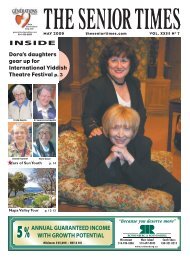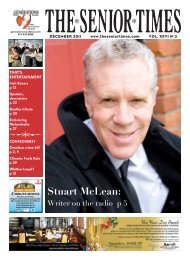Create successful ePaper yourself
Turn your PDF publications into a flip-book with our unique Google optimized e-Paper software.
American Dialect Society names the lexiest creations of the year<br />
Since 1990, the American Dialect<br />
Society, or ADS, has paid homage<br />
to the most sublime, lexiest creations<br />
of each year—new words<br />
that grace our lexicon annually.<br />
<strong>The</strong>se words have been drawn from<br />
a number of varied categories. For<br />
example, “gate rape” (defined as “pejorative<br />
term for invasive new airport<br />
pat-down procedures”) reigned<br />
supreme in the “most outrageous”<br />
category in 2010, and “waterboarding”<br />
won in the “most euphemistic”<br />
category in 2006.<br />
Each year, a “word of the year” is<br />
chosen and, as one would expect, the<br />
world of technology has provided us<br />
with the dominant neologisms, such<br />
as app (2010), tweet (2009), Y2K<br />
(1999), e-, as in e-mail (1998).<br />
Conclusive evidence of this trend<br />
arrived in 2010 when “google” was<br />
voted the word of the decade.<br />
At an ADS convention in Portland,<br />
Oregon, last month, it was decided<br />
that the word of the year for 2011<br />
was “occupy.” It was felt that “occupy”<br />
became an emblem for the<br />
whole protest movement.<br />
Ben Zimmer, language columnist<br />
at the Boston Globe, stated<br />
“occupy” in “just a few months<br />
took on another life and moved in<br />
<strong>The</strong> Word<br />
Nerd<br />
Howard<br />
Richler<br />
new and unexpected directions,<br />
thanks to a national and global<br />
movement.” I do not agree that<br />
“occupy” is being used in a distinct<br />
sense. Starting in the 14th century,<br />
it had a sense of taking possession<br />
of something by force. By 1920, the<br />
verb was used to mean to gain access<br />
to a piece of land or building without<br />
authority as a form of protest.<br />
And if I see another dumb joke on<br />
Facebook, such as “I’m gonna occupy<br />
a beer from the fridge now,”<br />
I’m going to seriously unfriend some<br />
people.<br />
Before dismissing the society’s<br />
choice, I would be remiss if I didn’t<br />
mention one particularly shocking<br />
sense of “occupy” that has fallen<br />
from our vernacular. From the 15th<br />
century to the beginning of the 19th<br />
century, “occupy” was used as an<br />
euphemism for engaging in sex. In<br />
John Florio’s Worlde of Wordes written<br />
in 1598, there is reference to<br />
C<br />
M<br />
Y<br />
CM<br />
MY<br />
CY<br />
CMY<br />
K<br />
“raskalie whores in Italy, who cause<br />
them to be occupide one and thirtie<br />
times by one and thirtie several base<br />
raskalie companions.”<br />
My favourite category this year was<br />
the “most creative” section. Here we<br />
sampled “bunga bunga,” referring to<br />
the sex parties associated with former<br />
Italian prime minister Silvio<br />
Berlusconi.<br />
Its etymology is somewhat murky,<br />
however a German actress claims<br />
that “bunga bunga” originated as<br />
Berlusconi’s nickname for her, and<br />
eventually morphed into his term for<br />
wild parties with young girls.<br />
But the winner in this category was<br />
“Mellencamp,” describing a woman<br />
who has aged out of being a cougar.<br />
Pop music enthusiasts will discern<br />
that the term is named after pop<br />
singer John Cougar Mellencamp.<br />
Indeed, eponymous neologisms<br />
were popular this year. To “Mubarak”<br />
is “to farcically hold on to power,” and<br />
if you’re “Mubaraked” to your chair<br />
it might mean you’re stuck in it. Another<br />
eponymous term that emerged<br />
this year was “Tebowing,” lampooning<br />
the praying pose of Denver Broncos<br />
quarterback Tim Tebow.<br />
Given its geopolitical importance,<br />
I was disappointed that the term<br />
“Arab Spring,” referring to popular<br />
uprisings against dictatorial regimes<br />
in the Arab world was not one of the<br />
nominees for word of the year. Mind<br />
you, it was runner-up in the “most<br />
likely to succeed” genre. <strong>The</strong> winner<br />
here was the word “cloud” referencing<br />
online space for the large-scale<br />
processing and storage of data.<br />
Another term in this category<br />
that I believe will have legs is “tiger<br />
mom,” which refers to an extremely<br />
strict parent.<br />
Lest you feel that Canada was given<br />
short shrift because neither the verb<br />
“to Harper” (to cut off debate) or “to<br />
McKay” (to use a military helicopter<br />
instead of a taxi while on vacation)<br />
did not register with American<br />
Dialect voters, I am proud to say that<br />
the impetus for the occupy movement<br />
had a Canadian genesis. It was<br />
on July 13 that the Vancouver-based<br />
anti-consumer magazine Adbusters<br />
suggested online that people “Occupy<br />
Wall Street” in lower Manhattan<br />
on Sept 17.<br />
<strong>The</strong> movement went viral and,<br />
thanks to the Canucks, the ADS had<br />
its word of the year.<br />
hrichler@gmail.com<br />
<strong>2012</strong>.01 Respite-on-Wheels <strong>Senior</strong> <strong>Times</strong>.pdf 1 12-01-18 12:13 PM<br />
www.theseniortimes.com <strong>February</strong> <strong>2012</strong> <strong>The</strong> <strong>Senior</strong> TimeS 7





